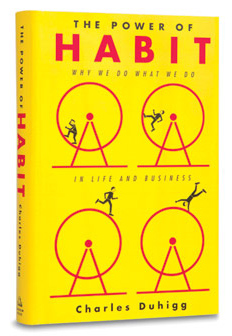 New York Times reporter Charles Duhigg’s book The Power of Habit, which came out in February of this year, stands apart from anything I’ve ever read on the subject of habits, in more than one way. Personally, I’m much more interested in the impacts on individuals than on figuring out how to use habits to, for instance, increase your company’s bottom line, a topic that takes up a substantial piece of Duhigg’s book. At the same time, Duhigg writes engagingly, constantly bringing in surprising pieces of information, and I was easily carried through reading the whole book. This isn’t a tough read.
New York Times reporter Charles Duhigg’s book The Power of Habit, which came out in February of this year, stands apart from anything I’ve ever read on the subject of habits, in more than one way. Personally, I’m much more interested in the impacts on individuals than on figuring out how to use habits to, for instance, increase your company’s bottom line, a topic that takes up a substantial piece of Duhigg’s book. At the same time, Duhigg writes engagingly, constantly bringing in surprising pieces of information, and I was easily carried through reading the whole book. This isn’t a tough read.
There are a lot of facets to habit development, but Duhigg focuses on the mechanics in a revealing and practical way. While this is a bit of a spoiler, I don’t think you’ll enjoy the book any less if I tell you in advance that he breaks habits down into three pieces: cue, routine, and reward. We’ll talk about this in more detail in other posts, but the short version is that the cue is the thing we’re used to responding to (e.g., passing the doughnuts on the weekly shopping trip, arriving home from work, feeling angry); the routine is what we usually do (buy a doughnut, sit down in front of the TV and turn it on, yell at the dog); and the reward is the need the habit developed to fill (a few moments of uninterrupted pleasure while eating the doughnut; a means of disconnecting from the cares of the day; no longer feeling powerless).
Duhigg talks about this habit loop first in terms of how we individually take part in it, then goes on to explain how Starbucks has used it to develop employees who are much more likely to cheerfully serve you your latte no matter what goes wrong and how Target used it to increase shopping in their store from new parents. He then expands the subject to change in society, describing how habits helped drive the Civil Rights movement, for example. Finally, almost as an afterthought, he lays out a very clear and useful process for changing a habit.
Whether your interest is improving a business, changing your own habits, or just understanding better what makes people tick, I highly recommend this book. It doesn’t begin to cover everything we need to know about habits-for instance, where ingrained problem emotional patterns like negativity or alienation begin, or the importance of belief-but the material it does cover is useful, well-researched, and interesting to read.


